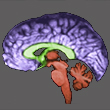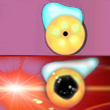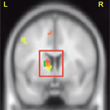Monday, 29 October 2012
Dusting Off the Triune Brain and the Limbic System
 In neuroscience, as in other fields, some concepts are so convenient that it no longer even occurs to us to question them. But no scientific knowledge can be taken for granted forever, so it makes sense to take such old concepts down from the shelf and dust them off from time to time.
In neuroscience, as in other fields, some concepts are so convenient that it no longer even occurs to us to question them. But no scientific knowledge can be taken for granted forever, so it makes sense to take such old concepts down from the shelf and dust them off from time to time.
Recently, two neuroanatomists, Pierre-Yves Risold and Helmut Wicht, did just that with two models—the “triune brain” and the “limbic system”—that have become questionable, to say the least, in light of more recent neuroanatomical findings. (more…)
Emotions and the Brain, Evolution and the Brain | Comments Closed
Monday, 22 October 2012
Optogenetics: Neurons Controlled by Light

Among the many new techniques developed in the neurosciences in recent years, few have caused as much of a stir as optogenetics. This strange marriage between the sciences of optics and genetics allows the activity of entire populations of neurons in the brains of living animals to be controlled with a simple ray of light. Just a decade or two ago, such a technique, which is relatively non-invasive and accurate to within one millisecond, would have been unimaginable! (more…)
Emotions and the Brain, The Senses | Comments Closed
Wednesday, 17 October 2012
Learning How To Pique Curiosity

What is learning? What teaching methods are the most effective? Under what conditions do we remember information best? These are big questions, and the subject of continuing debate.
Neuroscientists continue to contribute relevant data to this debate, in particular as regards the conditions that help us learn and retain information best. In 2009, Min Jeong Kang’s research team published a brain imaging study that confirmed the importance of a well known but often under-utilized condition for enhancing learning: curiosity. (more…)
Memory and the Brain | 3 comments »
Monday, 1 October 2012
Like Strangers in Their Own Land
 Fewer than 100 cases of foreign accent syndrome, have been identified worldwide, but it is certainly one of the strangest things that can happen to anyone. From one day to the next, a person wakes up speaking with what sounds like an accent from another country.
Fewer than 100 cases of foreign accent syndrome, have been identified worldwide, but it is certainly one of the strangest things that can happen to anyone. From one day to the next, a person wakes up speaking with what sounds like an accent from another country.
But in fact, this similarity is merely random. Scientists now know that foreign accent syndrome is actually a particular kind of aphasia that produces slight alterations in the prosody of language. Listeners then perceive these unusual variations in the rhythm and meolody of the person’s speech as a foreign accent. (more…)
From Thought to Language | Comments Closed







